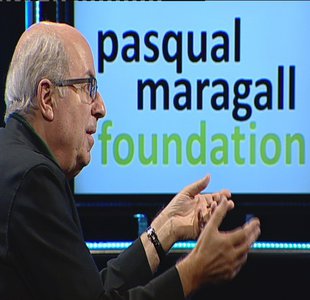Interview
Alzheimer's on the ropes

What is Alzheimer's disease exactly?
Alzheimer's is a neurodegenerative disease that appears late in life, from 60 to 65 years old on. We now live longer, so there are more cases of Alzheimer's. It's a devastating disease because it shows itself as a progressive deterioration of the cognitive function; you lose your memory.
That sounds like some peoples' worst nightmare.
Yes, it's the worst because in a wheelchair, for example, you can still move around. But when you have Alzheimer's disease you need other people to take care of you, and you can't do anything about it.
How does it develop?
As far as we know, the disease consists of an accumulation of a particular protein. This protein is a regular protein, but for reasons we don't understand very well, there is an accumulation that eventually begins to kill neurons. And at present this is a disease we cannot cure.
Why is it so difficult?
Right now we have no drugs to slow, stop or reverse the neurodegeneration. When the clinical symptoms of the disease appear, the brain is already very deteriorated and we are not able to reverse this. We do have drugs that can improve the quality of life of these ill people, so we can manage depression and so on, but these drugs do not modify the cause of the disease. However, there are new facts that tell us that biological signs of this disease appear 20 years before the clinical symptoms. This is something new and we think that for Alzheimer's these observations are the key to tackle the disease. So, we now need to know the natural history of the disease, to understand how it begins, when it begins, what factors speed it up or slow down, its biological evolution. And so we think we will be able to prevent or slow the biological progression of the disease when we are still apparently healthy.
Are drugs the only way, or can lifestyle help?
We are looking for drugs for when you already have the disease, but there is room for other practices. We have very little information but there are new observations that suggest that everything good for our health is good for our brains. In countries where people do things that are good against cardiovascular disease there are fewer cases of dementia. We are beginning to work with these approaches and I am convinced that if you lead a healthy life and have the best social relationships possible it must be beneficial.
Is it just living longer that is causing more cases, or is it also our modern lifestyles?
What is clear is that thanks to medicine and biomedical discoveries, we are now able to delay all the critical problems. Seventy years ago, when people reached 60 they had the same illnesses as people do now when they are 90. So thanks to biomedical changes and social improvements, we have been able to put off these problems to the later stages of life. So, the objective is healthy ageing, to modify our activities to delay the problems for as long as possible. People are now living longer all over the planet. And this is something new and we have no experience with this.
Tell us about the Pasqual Maragall Foundation?
Pasqual Maragall is an uncommon person and he decided when he was relatively well that he wanted to do something to help scientific research into this disease. The name Pasqual Maragall is very strong and he offered us an opportunity eight or nine years ago to form the Pasqual Maragall Foundation. It is a small foundation devoted to scientific research and we eventually decided to focus on prevention. This is very important for us because we are convinced that we will be able to reduce the number of people who end up with the disease. That is why our strategy is to focus on prevention, and we are very optimistic. We need a lot of money, of course, but the foundation has grown, despite this very deep crisis in Catalonia and Spain.
What is the public perception of Alzheimer's?
Fifteen years ago no one was talking about Alzheimer's disease, in part because it is a very bad disease and no one wanted to talk about it. However, the Pasqual Maragall Foundation has helped clear the air. We are contributing to putting this disease on the agenda, not only of politicians, but society in general. Because of the crisis we have not received public funds, so we depend on altruism. To be successful we need to invest in communication, to make it clear that Alzheimer's disease exists and that there are no shortcuts; only new knowledge will facilitate a radical solution for this disease. So we are investing in communication because we need to ask people to be part of our foundation, and now there are nearly 7,000 members, three times what there was two years ago.
Leave a comment
Sign in.
Sign in if you are already a verified reader.
I want to become verified reader.
To leave comments on the website you must be a verified reader.
Note: To leave comments on the website you must be a verified reader and accept the conditions of use.




